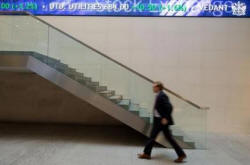|
 Oil
prices sink further and give boost to European shares Oil
prices sink further and give boost to European shares
 Send a link to a friend
Send a link to a friend
[January 12, 2015] By
Marius Zaharia
LONDON (Reuters) - Oil prices showed no
sign of escaping their downward spiral on Monday and signs emerged that
cheap crude may have a positive impact on the European economy, with
airlines and the auto industry leading the region's shares higher.
|
|
 The U.S. dollar edged higher as the majority of investors who expect
a stronger greenback were given a chance to reload after a weakening
in the aftermath of a surprise fall in U.S. wages on Friday. The U.S. dollar edged higher as the majority of investors who expect
a stronger greenback were given a chance to reload after a weakening
in the aftermath of a surprise fall in U.S. wages on Friday.
German airline Lufthansa rose 2.5 percent after saying it expects
the lower price of oil to cut its fuel bill for 2015 by 13 percent
after the cost of hedging, setting it on course for a rise in profit
this year.
Automotive supplier Continental rose 2.3 percent after saying it
expects sales growth to quicken to around 5 percent this year as
global passenger car production rises moderately.
"Historically, oil price collapses coincided with a weakening
economy. This time it's different and the market has to learn that,"
said Jochen Rothenbacher, research and sales director at Equinet
Bank in Frankfurt.
The pan-European FTSEurofirst 300 index rose 1 percent to 1,361.64
points, while the euro zone's blue-chip Euro STOXX 50 index advanced
1.5 percent. Wall Street was also expected to open higher.

In contrast, the cheap oil and stronger dollar added to pressure on
emerging markets, with Russia once again suffering most of the pain.
Moscow was downgraded to BBB- by Fitch late on Friday.
"The more oil falls the more the numbers don't add up for Russia,"
said Manik Narain, strategist at UBS.
U.S. crude for February was down $1.13 at $47.23 per barrel and the
February Brent contract was down $1.31 at $48.80 a barrel. Both hit
their lowest since April 2009.
Analysts at Goldman Sachs lowered their three-month price forecast
for Brent to $42 a barrel from $80 and cut U.S. crude to $41 from
$70, adding it would stay near $40 for most of the first half of
2015. [O/R]
Fires over the weekend at refineries in Ohio and Pennsylvania also
hurt demand for crude in the United States.
[to top of second column] |

DOLLAR STILL STRONG
The dollar rose 0.3 percent against a basket of currencies after
falling on Friday when investors shrugged off a strong increase in
U.S. payrolls, focusing on a five-cent decline in hourly wages, the
biggest in at least eight years.
Friday's reaction came as markets pushed out the likelihood of a
Federal Reserve interest rate hike, but the stark contrast between
monetary policy in the United States and that of other big economies
such as the euro zone and Japan kept the greenback in demand.
"The earnings figures may be an aberration as they don't correlate
with everything else that is going on in the labor market," said
Marshall Gittler, head of global FX strategy at IronFX.
In bond markets, Spanish and Italian 10-year yields slipped after
Italy's central bank chief said on Sunday the risk of deflation in
the euro zone should not be underestimated. He said the best way to
tackle the problem was to buy government bonds.
The drop in the dollar helped gold nudge up to its highest in a
month around $1,231 an ounce.
(Additional reporting by Francesco Canepa; Editing by Peter Graff)
[© 2014 Thomson Reuters. All rights
reserved.] Copyright 2014 Reuters. All rights reserved. This material may not be published,
broadcast, rewritten or redistributed.

 |